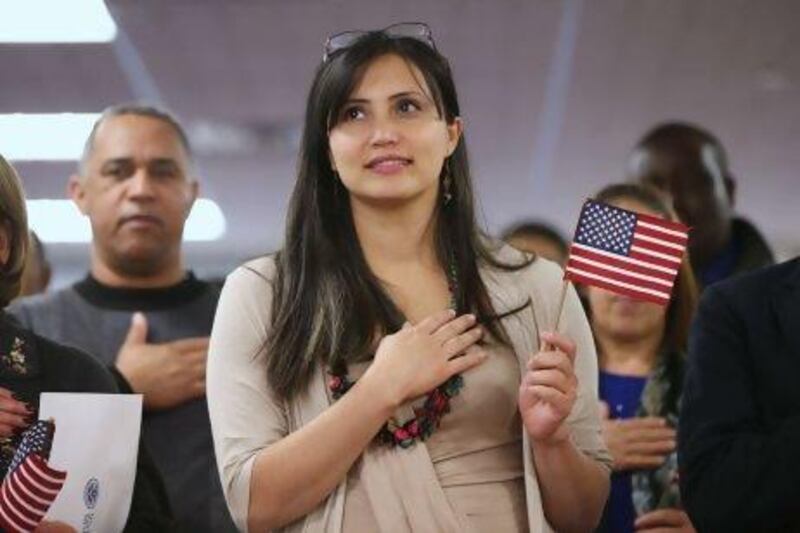NEW YORK // With more than 11 million illegal immigrants living in the shadows in the US, many of them unskilled workers doing jobs Americans are unwilling to do, the president is urging Congress to move quickly on legislation to fix the system and put them on a path to citizenship.
"The time has come for common sense, comprehensive immigration reform. Now's the time," Barack Obama said during a visit on Tuesday to Nevada, a state that Latinos swung in his favour in November's election.
After spending billions on enforcement that has had little effect, and nearly half-century-old immigration laws that fail to address 21st-century economic realities, Democrats and Republicans have long agreed that something must be done.
Mr Obama's re-election, which hinged in large part on Latino voters, and a Republican realisation that they cannot afford to lose them because of anti-immigrant policy stances, has suddenly brought about consensus that action must be taken to address a politically toxic issue that has languished in Congress for more than a decade.
Speaking at a majority-Latino high school in Las Vegas, Mr Obama laid out a set of principles he hopes will guide the debate in Congress.
He also praised a proposal by eight senators - four from each party - released on Monday, describing it as "in line" with his own ideas, but warned that if Congress failed to swiftly pass a law, he would force it to vote on his own, more liberal plan.
Mr Obama's plan contains broad proposals on strengthening border security, cracking down on employers of illegal immigrants, streamlining the legal immigration system and, perhaps most politically important, creating a path to citizenship for illegal immigrants already in the country.
"It is easy sometimes for the discussion to take on a feeling of 'us versus them'. And when that happens, a lot of folks forget that most of 'us' used to be 'them'," Mr Obama said.
He also focused on the economic necessity of offering permanent residence visas, known as green cards, to immigrants who graduate with advanced degrees in the sciences and maths.
"We're giving them all the skills they need, but then we're going to turn around and tell them to start that business and create those jobs in China or India," he said. "That's how you give new industries to our competitors."
Republicans, chastened by their party's large election losses among Latino voters, appear to have acknowledged that losing the demographic's support would amount to electoral suicide in coming years.
Most of the illegal immigrants are from Mexico and Central and South American countries.
But there are already signs that even with a bipartisan push for reform, the debate could become contentious and drawn out, with no guarantees of an agreement.
Mr Obama did not mention one of the main planks of the plan endorsed by two key Republican senators, Marco Rubio and John McCain, that ties support to first securing the Mexico border.
Mr Rubio on Tuesday criticised Mr Obama, saying he was "concerned by the president's unwillingness to accept" the conditions.
Analysts expected the rare consensus to begin fracturing once the important details begin to be debated. "I think this is going to be long, drawn out and painful," said Anna Law, a professor of political science at Brooklyn College in New York who studies immigration.
Ms Law also worked for a congressional committee on immigration reform in the 1990s during a bipartisan push that failed.
"The sequencing [of legalisation and enforcement] is also a sticking point," she said. "What is the measure for when we consider the border secure? Who gets to determine that? Both sides have very different priorities."
Republican legislators, especially in the House of Representatives, will have a difficult time convincing their generally white and conservative voter base.
"This is going to be a very tough sell for people representing districts where a lot of people are out of work," Ms Law said. "Voters are not thinking, 'how can I help my party win the election four years out', they're thinking 'I don't have a job'."
The proposed plans only vaguely address one of the fundamental causes of illegal immigration, which is the limited availability of visas for unskilled workers.
"If the system isn't credible, people will just jump the line and cross illegally," Ms Law said. "I'm a little fearful that in the grand rush to get something done we'll get something awful that is not really well thought through."
twitter: For breaking news from the Gulf, the Middle East and around the globe follow The National World. Follow us






